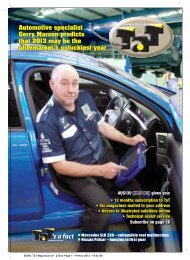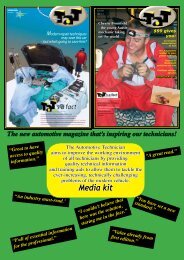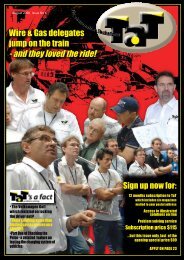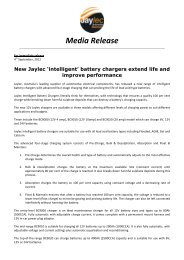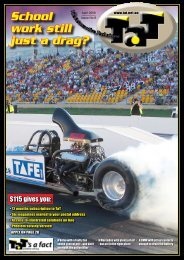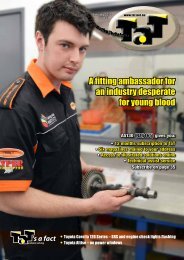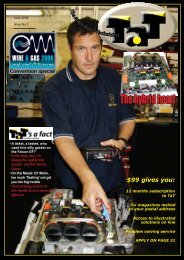What really does cause induction contamination? - TAT - The ...
What really does cause induction contamination? - TAT - The ...
What really does cause induction contamination? - TAT - The ...
Create successful ePaper yourself
Turn your PDF publications into a flip-book with our unique Google optimized e-Paper software.
I still believe if a fuel is poor quality or if<br />
the mixture is over rich <strong>cause</strong>d by leaking<br />
injectors, more of this unburnt fuel will be<br />
left in the intake system and <strong>cause</strong> sludge.<br />
However, I am starting to think that<br />
crankcase oil caught up in the breather and<br />
entering the intake system may be a bigger<br />
issue then we realise. Some years back I<br />
was involved with the import and servicing<br />
of the Toyota Surfs 2 litre and 1KZ engines.<br />
<strong>The</strong>y had a major problem with oil entering<br />
the intake system.<br />
At the time I put it down to bad design<br />
in the engine breathing system. I had<br />
modified the breather, fitting steel wool<br />
inside, and when that did not work I<br />
redesigned the inside of the rocker cover<br />
with bigger chambers and more baffles and<br />
even this did not work. I also had turbos<br />
rebuilt to ensure that they were not the<br />
culprit.<br />
No matter what I tried I could not solve this<br />
problem. <strong>The</strong> Toyota Estima with the layon-the-side<br />
3CT engine is even worse.<br />
I have this unproven theory that when the<br />
turbo is on boost it would pressurise the<br />
engine through the breather. When the<br />
turbo comes off boost, the pressure being<br />
released from the turbo creates a vacuum<br />
and draws the oil up into the intake system.<br />
I have in the past blocked off EGR systems<br />
in Surfs due to running factors, but this<br />
has not stopped the build-up forming in the<br />
intake system. <strong>The</strong> issue of poor quality<br />
fuel being the <strong>cause</strong> is another argument<br />
and possibly has some truth, but I have<br />
witnessed badly sludged build-up in the<br />
diesel intake systems on used engines that<br />
are straight out of Japan. I have been told<br />
that Japan has a better quality of fuel than<br />
ours.<br />
With the advent of common rail direct<br />
injection, it would seem that the intake<br />
build-up has escalated to plague<br />
proportions.<br />
I admit I have been<br />
blaming the poor fuel<br />
and the EGR. But after<br />
my experience with<br />
a Hilux I am starting<br />
to think back to all my<br />
past experiences and I<br />
continue to question the<br />
main <strong>cause</strong> of this sludge.<br />
I do not know why common<br />
rail systems appear to have a<br />
much bigger issue and this is another<br />
issue I would like to investigate.<br />
Many people blame everything to do with<br />
diesel sludge as a fuel issue and I know<br />
this is not always the case. It’s a problem<br />
we all need to understand.<br />
It is not enough to have the best product on<br />
the market to clean this sludge out of the<br />
<strong>induction</strong> system. <strong>The</strong> fact is, there should<br />
never be this much sludge in the first place.<br />
I realise petrol engines also have problems<br />
and I am comfortable with the fact that our<br />
fuel quality has a lot to do with this as well<br />
as other factors. Generally speaking, petrol<br />
engines, if serviced regularly and with the<br />
right fuel treatments and the necessary<br />
<strong>induction</strong> servicing, will keep most petrol<br />
engine intake systems under control.<br />
I have been using the BG products for<br />
both the petrol and diesel engines for<br />
some time and have found<br />
them to be very good. Most<br />
customers comment<br />
on how well their<br />
vehicles are running<br />
after the <strong>induction</strong><br />
system has been<br />
cleaned. It’s not<br />
hard to understand<br />
that the engine can<br />
then breathe properly<br />
again.<br />
TaT and its specialist<br />
workshops are highlighting this<br />
growing problem in the hope that some<br />
answers might emerge, either from fellow<br />
workshop technicians or from engine<br />
specialists.<br />
In the meantime, working on the principle<br />
that shared knowledge is worthwhile, TaT<br />
invites technicians to send in their photos<br />
and ideas about <strong>contamination</strong> build-up in<br />
engines. Only by sharing examples and<br />
techniques will we ever find the truth.<br />
YOU<br />
SAID<br />
IT!<br />
You get what<br />
you pay for<br />
This fuel filter was removed<br />
from a customer’s Jackaroo.<br />
Once out of the car, I did the<br />
normal procedure and drained<br />
it, and then I noticed a jingling<br />
noise coming from inside the<br />
filter like something was loose. <br />
My curiosity was aroused, so in<br />
an idle moment I cut it open and<br />
flopping around inside was the<br />
inside end cap which had come<br />
away from the glue that bonds<br />
it. <strong>The</strong>refore, the fuel filter was<br />
not working at all. When I see<br />
things like this, it justifies my<br />
decision to always use premium<br />
quality parts. <br />
Jason Smith <br />
JDS Automotive <br />
MOOROOLBARK VIC<br />
(<strong>The</strong> real question this little<br />
story raises is: would a supplier<br />
of a cheap filter, used in a late<br />
model vehicle, come to the<br />
party when serious damage<br />
is <strong>cause</strong>d to the engine<br />
be<strong>cause</strong> of <strong>contamination</strong>.<br />
In our view, it’s possible for a<br />
high performance engine to<br />
be destroyed if particles in the<br />
fuel were not captured by an<br />
effective filter. Why would you<br />
use cheap and nasty parts<br />
which can often come back and<br />
bite the person who installed<br />
them. Money is no longer an<br />
excuse in these situations. Ed) <br />
<strong>The</strong> Automotive Technician 7




